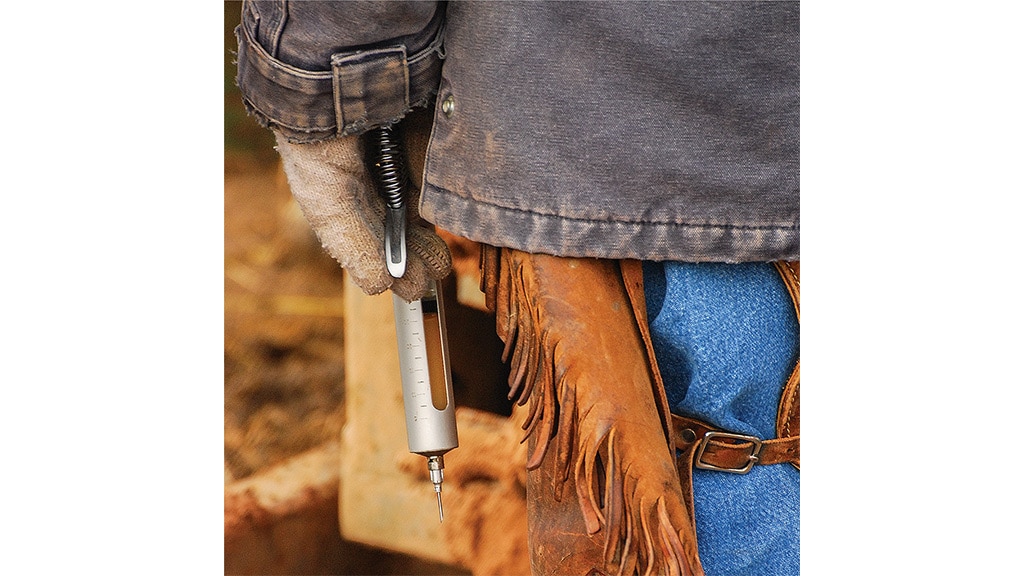
A herd of cows and young calves in Montana are moved to large pastures further from ranch headquarters for the summer. Distance makes regular checks more challenging, but still critical especially when conditions like heat, drought, or storms increase stress.
Agriculture, Livestock/Poultry June 01, 2024
Stressing Herd Health
Prevent, observe, and adapt to stay ahead in challenging conditions.
by Martha Mintz
The heat is on! Summer 2023 was a scorcher for many and the year as a whole worldwide was the hottest ever recorded. Recent years also haven't lacked for drought, smoke, and floods. Mother Nature likes to keep livestock producers on their toes!
In extreme conditions, access to shade, shelter, quality nutrition, and clean fresh water becomes more critical—and more challenging to maintain. When one of these foundational elements is compromised, often so is herd health and performance.
"Cattle should be observed on a regular basis," says DL Step, DVM for Boehringer Ingelheim.
While that's always a good practice, it's advisable to make even more frequent visits when experiencing abnormal conditions including long-lasting challenges such as heat or drought, he says.
Besides ensuring base needs are being consistently met, more frequent observation and interactions increases the odds for quick detection of disease outbreaks. Stressed livestock can be more vulnerable to disease.
"Extreme conditions put stress on animals. Because of that stress they may not be able to respond to disease challenges as effectively as they would under normal circumstances," Step says.
The sooner a problem is identified, the sooner a treatment plan can be put in place and the less impact it should have on herd performance.
The impact of stress, especially heat stress, on immune response has been studied extensively in dairy cattle. For example, stress proved to be the driver of increased mastitis cases in summer.
It was once thought higher mastitis rates in summer were due to increased pathogen loads. Heat encourages pathogen growth. Logically, more pathogens means more mastitis. That proved to not be the case, says Geoffrey Dahl, University of Florida animal sciences professor and director of the Feed the Future Livestock Systems Innovation Lab.
"[The increase of mastitis] is due more to the cow's ability to respond to the pathogen being diminished by heat stress more-so than pathogen load," he says.
Fall-calving beef cattle may be subject to more dramatic, long lasting impacts of heat stress.
"In dairy cattle, the time period we see the most dramatic effects of heat stress is [when it occurs] at the end of gestation," Dahl says.
Late gestation heat stress reduces milk production and has lasting negative impacts on the calf. Calves born to heat-stressed mothers have reduced immune function, health, and growth.
"Calves born to those cows are destined to be less productive and stay in the herd for less time than their counterparts," Dahl says.
While most of the beef herd won't see heat stress at this critical time in gestation, there is evidence that heat stress even early in gestation can negatively impact offspring, he says.
In pasture situations it can be difficult to mitigate heat stress, but not impossible. Strategic rotations landing cattle in pastures with abundant shade and excellent water during peak heat may be worth the effort.
Above. Herd health protocols including properly timed vaccinations at branding and preconditioning establish immunity to help calves better weather the normal stress of weaning and shipping. Extreme weather conditions or extended poor conditions bring stress to the pasture, increasing the need to carefully monitor herd health.
Moving target. Extreme cold and prolonged drought impact herd health in other ways, too.
"We continually see more movement in cattle populations and in forages," Step says. Challenging conditions cause producers to sell or relocate cattle, or bring in outside forage or feedstuffs. Diseases can move with cattle; and toxic plants can come in with hay.
If a farmer or rancher experiences an unusual health challenge, they should work with their local veterinarian, nutritionist, and other experts to correctly identify the problem and create a plan to manage it, Step says.
While the weather is beyond control, its impact can be blunted. Be aware of when stress occurs, proactively reduce stress where possible, and be vigilant for changes in herd health. ‡
Read More

AGRICULTURE, SUSTAINABILITY
Spotlight on Sulfur
The missing ingredient in many row crop nutrient plans.

AGRICULTURE, EDUCATION
Land of Extremes
1,500 years of tree ring data shows wild climate swings on the prairies.


